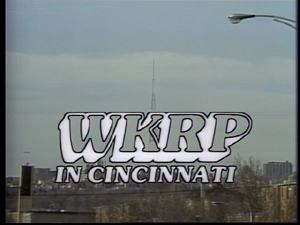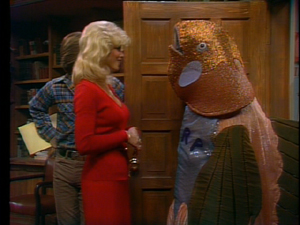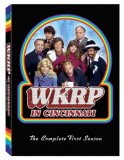| Reviews & Columns |
|
Reviews DVD TV on DVD Blu-ray 4K UHD International DVDs In Theaters Reviews by Studio Video Games Features Collector Series DVDs Easter Egg Database Interviews DVD Talk Radio Feature Articles Columns Anime Talk DVD Savant Horror DVDs The M.O.D. Squad Art House HD Talk Silent DVD
|
DVD Talk Forum |
|
|
| Resources |
|
DVD Price Search Customer Service #'s RCE Info Links |
|
Columns
|
|
|
WKRP in Cincinnati: The Complete First Season
Fox // Unrated // April 24, 2007
List Price: $39.98 [Buy now and save at Amazon]
 "Alright, Cincinnati, it is time for this town to get down! You've got Johnny. Doctor Johnny Fever! And I am burnin' up in here! Wooo! We all in critical condition, babies, but you can tell me where it hurts, 'cause I got the healing prescription here from the big KRP musical medicine cabinet. Now I am talking about your fifty thousand watt intensive care unit, babies! So just sit right back now, relax, open you ears real wide, and say 'Give it to me straight, doctor, I can take it!' Oh, and I almost forgot, fellow babies: BOOGER!!"
"Alright, Cincinnati, it is time for this town to get down! You've got Johnny. Doctor Johnny Fever! And I am burnin' up in here! Wooo! We all in critical condition, babies, but you can tell me where it hurts, 'cause I got the healing prescription here from the big KRP musical medicine cabinet. Now I am talking about your fifty thousand watt intensive care unit, babies! So just sit right back now, relax, open you ears real wide, and say 'Give it to me straight, doctor, I can take it!' Oh, and I almost forgot, fellow babies: BOOGER!!"When discussing the funniest, smartest, all-out best moments in the history of television, a good chunk of that chat must be given to "WKRP in Cincinnati." The series was a sitcom perfect storm: brilliant writing, colorful characters, an expert cast.
Created by Hugh Wilson (he'd later go on to create "Police Academy" and the short-lived dramedy "Frank's Place," among others), "WKRP" was based in part on anecdotes taken from Wilson's stint in advertising, which included dealing with an Atlanta-based rock station. (Yes, fans, "Turkeys Away" was inspired by real events. No kidding.)
Wilson's set-up comes from the workplace comedy playbook: a clueless boss and a collection of eccentrics surround our main character, the lone voice of sanity. But to call Andy Travis the main character in "WKRP" would be to ignore the ensemble work of the series - here is a show where there is no defined center. Gary Sandy, playing Travis, and Gordon Jump, as station manager Arthur "Big Guy" Carlson, would receive top billing during the show's first season, with the rest of the cast listed during the closing credits. Even then, Wilson's scripts (and those of the writers that would follow him) never treated either character as the sole core of the series. Indeed, the best episodes would turn out to be the one in which every cast member was given ample screen time. (As such, the cast would all get mention in the opening credits beginning with season two.)
Those not-so-secondary supporting players include: Jennifer Marlowe (Loni Anderson), blonde bombshell receptionist; Dr. Johnny Fever (Howard Hesseman), perpetually stoned morning DJ; Herb Tarlek (Frank Bonner), sleazoid sales manager; Les Nessman (Richard Sanders), five time winner of the Buckeye Newshawk Award; Venus Flytrap (Tim Reid), nighttime DJ hired to bring some soul to the station; and Bailey Quarters (Jan Smithers), recent graduate of journalism school.
The comedy throughout the series would come from the characters themselves, with most of the jokes resulting from character quirks that became well known to fans as the show progressed. Herb's freakishly ugly polyester suits, his failed attempts to hit on Jennifer, Arthur's fumbling ways, Les' inept newscasts - each character contributed to the humor of the situation in unique yet familiar ways, and it was the show's deep understanding of how each character worked that made it such a success. (In turn, such knowing writing was then brought to life by a dynamite cast, each member easily handling the comedy as it would careen from sly to broad and back again.)
"WKRP" hit the ground running, with many of its most fondly remembered episodes coming from its first season (1978-79). The two-part pilot (in which Andy Travis arrives in town as the new programming manager and changes the station's format from easy listening to rock) has more classic moments in its fifty minutes than most series have in an entire season. "Hoodlum Rock" introduces Cincinnati to the exceedingly polite punk rock band Scum of the Earth. Name-that-song radio contests get a biting parody in "The Contest Nobody Could Win." "Commercial Break" delivers the world's worst funeral home jingle. And these are some of the lesser entries of the season.
 The series' first full-on TV classic moment arrives in "Turkeys Away," in which Arthur's plans to hand out free turkeys goes horribly awry - resulting in what is possibly the most quoted line of the show's entire run: "As God is my witness, I thought turkeys could fly." The entire episode is a mini-masterpiece of comedy, building on increasingly hilarious ideas, the insanity growing and growing.
The series' first full-on TV classic moment arrives in "Turkeys Away," in which Arthur's plans to hand out free turkeys goes horribly awry - resulting in what is possibly the most quoted line of the show's entire run: "As God is my witness, I thought turkeys could fly." The entire episode is a mini-masterpiece of comedy, building on increasingly hilarious ideas, the insanity growing and growing.Listen to Richard Sanders in action, as Les recounts the turkey invasion of the Pinedale Shopping Mall. At first, it's just a case of thick-headed naiveté (he struggles to read a banner: "It says Happy... ... Thanks... ... ... ... ...Giving!"), and then he erupts into an absurd bout of journalistic sincerity (it's said Sanders studied the legendary broadcast of the Hindenburg crash - "Oh the humanity!").
Sanders nabs the spotlight again in "A Date with Jennifer," in which Jennifer agrees to accompany Les to the Silver Sow Awards. With so many things going on within the episode, it must take something special to shine above it all, and Les delivers. As Foreigner's "Hot Blooded" blares on the soundtrack, Les dances around the office bullpen, shedding his meek, nerdy image, replacing it with ascot and curly toupee. It's such a simple comic idea, yet it's taken to glorious heights thanks to everything we already know about Les.
The very best of the bunch comes in "Fish Story," an episode that was crafted after CBS executives insisted on more slapstick-style humor and less dramatic asides. (Wilson had opted to let the show tackle social issues early on. One early episode deals with homosexuality, another with military desertion. A tornado was once used as the basis of a heavily dramatic episode. Later seasons would get equally somber, most notably a show devoted to the Cincinnati Who concert where eleven people were killed.) In a bit of comedy irony, Wilson tried to sabotage the episode by loading it with as many sitcom clichés and dimwitted, over-the-top humor possible, yet the excess wound up actually working in the show's favor.
In retrospect, "Fish Story" probably shouldn't work at all. With four plotlines running on top of each other, the episode should be too busy, too hectic, too much. But that's its greatest strength, really, as the show becomes one damn thing after another, once again with ever-increasing lunacy. It becomes a great farce, especially in its final moments, as the subplots begin to crisscross in all the right ways. Surprisingly, the episode, much loved by fans and landing huge ratings when it first aired, remains hated by Wilson.
"WKRP" shook off a troubled start - low ratings led it to a midseason hiatus, and its first episode back was an awkward flashback show to help re-introduce the characters - by beefing up the character interaction (the "bullpen," designed for a more open mingling area for the cast, wasn't seen until midseason); more delicately mixing the broad comedy with smaller, more intimate storylines; and allowing for a local flavor (fictional neighborhoods of the early episodes were replaced with authentic Cincy references later on). Even when the show relied on well-worn sitcom plots (Jennifer has to pretend to be married to Johnny, for example), it's the solid writing that elevates it to something much more than your average TV comedy.
It helped that when it returned from hiatus, CBS placed it after "M*A*S*H," where enough people managed to see it to land it three consecutive Emmy nominations for Best Comedy. However, CBS soon began to shuffle it around in the schedule, the ratings dipped as a result, and the network cancelled it after four seasons. Most of the show's popularity ultimately came later, as throughout the 1980s it became one of the most successful of all the MTM programs running in syndication.
 The DVD
The DVD"...but the Senator, while insisting he was not intoxicated, could not explain his nudity."
After years of uncertainty, the first season of "WKRP" finally arrives on DVD. All 22 episodes from the 1978-79 run are included in a three-disc set from MGM/Fox. The discs come in two slimline cases which are housed in a cardboard slipcover.
The episodes included are:
Disc One: "Pilot (Part 1)," "Pilot (Part 2)," "Les on a Ledge," "Hoodlum Rock," "Hold-Up," "Bailey's Show," "Turkeys Away," and "Love Returns."
Disc Two: "Mama's Review," "A Date with Jennifer," "The Contest Nobody Could Win," "Tornado," "Goodbye, Johnny," "Johnny Comes Back," "Never Leave Me, Lucille," and "I Want to Keep My Baby."
Disc Three: "A Commercial Break," "Who Is Gordon Sims?," "I Do, I Do... For Now," "Young Master Carlson," "Fish Story," and "Preacher."
Now comes the bad news. The main reason "WKRP" was kept away from DVD for so long is the issue of music rights. The show's setting necessitated an unusual amount of current and classic rock hits, and its producers prided themselves on delivering the musical goods. In a bit of good fortune, music rights costs were considerably lower for shows recorded on videotape instead of film, and the producers were able to pick up big name tunes on a budget, with rights lasting for a full decade.
And so replacing key songs wasn't even an issue until the 1990s, when the show returned to syndication. By this time, the music rights rules had changed, bands had become legends, and reimbursing Pink Floyd for a thirty second snippet became too pricey. MTM (which was now owned by Fox) opted to replace almost all the songs with generic library music - even quick clips that were probably generic library music the first time around were replaced, just in case. As such, some dialogue had to be redubbed (some of it to remove DJ references to bands playing on air, some of it to replace words spoken over the music), and on occasion, entire scenes had to be removed (as they revolved entirely around the song).
After "Miami Vice" landed on DVD after years of its own music rights-related doubt, fans' hopes started growing. Could Fox bring back "WKRP" with all, or at least most, of its original music?
The short answer: no. The episodes in this set are shown in their redubbed syndicated versions (although all scenes cut for time and not for music do reappear here). Les' toupee dance in "A Date with Jennifer" is now done to a lifeless Foreigner imitation. Johnny's mid-song format change in the pilot now features some anonymous guitar samplings, not Ted Nugent. Song titles in "The Contest Nobody Could Win" are replaced by phonies. The quick scene of Venus' drunken ramblings in "Fish Story" is cut. So is Arthur's quiet discovery of Pink Floyd's "Dogs."
All that remains are the opening and closing themes, songs written explicitly for the series (the Ferryman Funeral Home jingle; the tunes performed by guest stars Hoyt Axton, Barrie Youngfellow, and "Scum of the Earth"), and some public domain numbers. Fortunately, we still get to enjoy Johnny's riffing on "You're Having My Baby."
Oddly, such replacements cause some nonsensical moments: Johnny's post-song comments mention Eric Clapton and Jerry Lee Lewis, although that's not their music we just heard. And Johnny's constant air guitar now seems all out of whack - does the man have no rhythm?
Having said all that, allow me to now take the risky position of defending this new, truncated "WKRP." For starters, most of the redubbing has been done rather seamlessly, and aside from a few awkward moments, the changes shouldn't be noticeable to newcomers. (Wilson himself on a commentary track said he's satisfied with the way the alterations turned out.) As for the scenes cut, they are short enough not to affect the story in any way, and they are limited - only two episodes ("Hoodlum Rock" and "A Date with Jennifer") are in their shorter syndication cut; all other cuts are only a few seconds. It also helps that the DJs had a habit of turning down the music right after it started playing, eliminating the need for even more dubbing.
Most important to remember is that "WKRP" is based on story, not music. The scripts are solid enough that they hold up no matter what music appears around the edges.
Still, this is obviously not the original series fans have wanted for years, and that's cause for understandable concern. While it's easy to understand the business concerns that went into the decision not to pay for music rights, surely viewers are in turn not getting the complete experience with this set.
Click here for a complete list of changes made to the first season. Jaime Weinman has been following the complicated world of music replacement in his blog, and his research is invaluable to any fan of classic TV on DVD.
 Video & Audio
Video & Audio"No parachutes yet. Can't be skydivers. I can't tell just yet what they are, but... Oh my God, Johnny! They're turkeys! Johnny, can you get this? Oh, they're plunging to the earth right in front of our eyes! One just went through the windshield of a parked car! Oh the humanity! The turkeys are hitting the ground like sacks of wet cement!"
For a series shot entirely on videotape, "WKRP" has held up rather well over the years. There's plenty of softness, to be sure, but considering the source material, that's understandable. With no edge enhancement or other digital garbage in the way, we're left with a picture that looks like it did when it first ran, if you were watching on a fairly decent TV. In other words: not great by any means, but it sure could've been worse. Presented in the original 1.33:1 broadcast format.
With no original music around to demand a spotlight, there's no need for heavy audio remixing. And so we get the soundtrack in a perfectly acceptable Dolby mono, with optional English and Spanish subtitles.
Extras
"Remember: Red Wigglers, the Cadillac of worms. Available in fine worm shops everywhere."
Wilson, Anderson, and Bonner reunite for audio commentary on two episodes: "Pilot (Part 1)" and "Turkeys Away." When they're talking, they're fountains of information goodness, and their affection for each other, the rest of the cast, and the show itself is infectious. But, understandably, they spend large chunks of both commentaries simply laughing at the on-screen action, which they admit still holds up decades later.
Two tiny featurettes feature more of the cast - Reid and Smithers also participate in these talking head interviews. "Do My Eyes Say Yes?" is a brief celebration of the Jennifer character (I'm assuming similar tributes will appear in future volumes); "A Fish Story Story" lets Wilson explain why the famous episode is his least favorite. Both featurettes are all too short (just a few minutes apiece), containing only minor information presented in sound bites and quick clips.
Final Thoughts
"What do you say, beautiful? How 'bout you and me getting it together tonight? You only go around once in life, so why not grab a little gusto?"
"I don't like little gustos, Herb."
In a fair world, "WKRP in Cincinnati: The Complete First Season" would jump straight into the DVD Talk Collector Series. But this is not a fair world, and the set is a collection of edited material, not the originals viewers deserve. On the other hand, this is one of the best programs to ever hit the airwaves, and to ignore it simply because of replacement music would be to ignore total brilliance. So despite the alterations, "WKRP" is still Highly Recommended. After all, you can't ignore the doctor. Can you dig it, my fellow babies?
|
| Popular Reviews |
| Sponsored Links |
|
|
| Sponsored Links |
|
|
| Release List | Reviews | Shop | Newsletter | Forum | DVD Giveaways | Blu-Ray | Advertise |
|
Copyright 2024 DVDTalk.com All Rights Reserved. Legal Info, Privacy Policy, Terms of Use,
Manage Preferences,
Your Privacy Choices | |||||||













